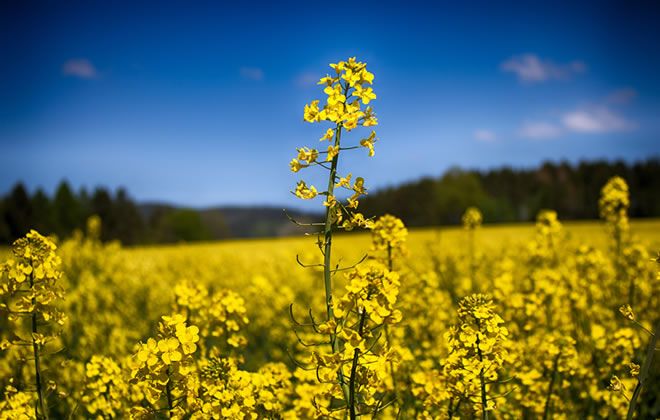
Duncan Farrington joined his family as a fourth-generation farmer. Shortly after he finished University, he became captivated with rapeseed and decided to pursue his passion for it and its benefits. In 2005, he launched Britain’s first ever ‘seed to bottle’ cold pressed rapeseed oil. This was the birth of Farrington’s Mellow Yellow Oils.
With the help of a Leader Grant, Farrington Oils decided to improve the quality of their land by adapting a minimum tillage approach over traditional intensive cultivations.
This decision has increased the soil organic matter by 66%
The next stage for the farm was to reduce the need for manmade fertilisers and pesticides, Duncan wanted to achieve this by implementing a no till seed drill.
Benefits of Automation
No till seed drilling is a great way to keep nutrients in the soil and lower the environmental impact. This is because there is less weight of machinery on the ground, the movement of the soil decreases and the ability to directly plant the seed. This leads to less disturbance of the organic matter and better soil health. There is an increased water absorption, less water run-off, less need for fertilisers and reduced pollution. The benefits of this we see are an increase in soil biodiversity and reduction in ammonia and emissions (from the fertilisers).
Efficiency
The ability to be able to directly place fertiliser with three different types of seed will also decrease the amount of fertiliser used.
Around 60% less than conventional practice using a fertiliser spreader
The drill is also linked to the tractor’s GPS monitor, this satellite technology enhances productivity. The technology doesn’t stop here, the drill is linked to a laptop so that the farmer can create a map of the yield, soil health and seed rate for each field. What does this mean for everyday farming? It allows areas of the field to be analysed and areas which result in lower yields can be treated with more seed and fertiliser. Over time the farm will see a year on year decrease on the reliance of man-made fertilisers and pesticides. Great for the farmer, great for the environment.
Carbon Reduction
As a Linking Environment and Farming (LEAF) supporter Duncan has ensured that everything he has learnt from his own farm and research is shared with other local farmers. This knowledge sharing is paramount in influencing and changing behaviours within the farming community. Duncan hopes to aid other farmers to improve their soil husbandry, he regularly rents his high-tech equipment to other local farmers and even sowed the seeds for a local cricket field last year. In the mission to continue this knowledge sharing, Duncan hosted a Chinese delegation group with LEAF, including the Chinese Minister of Agriculture and UN delegate in September 2019. In a recent blog post Duncan stated that if this technique and technology was mirrored across the world.
"The benefits could be enormous; it has been estimated that agriculture could reduce global CO2 emissions by between 10% and 30%."
Job Creation
These are not the only benefits that Farrington Oils have seen as a result of their £26,825 LEADER programme funded project. They have also seen a sustainable growth in the overall business, with an increase in income, productivity and further employment. There are now 14 employees working on the farm. Far exceeding their growth expectations for this year.
Get in touch for support
The LEADER Programme has now come to a close. For support and advice for rural businesses, contact our team at [email protected] or book in a chat via this online form.
The LEADER Programme was funded by the Rural Development Programme England (RDPE), the Department for the Environment, Food and Public Affairs (Defra), and the EU’s European Agricultural Fund for Rural Development (EAFRD).